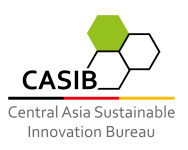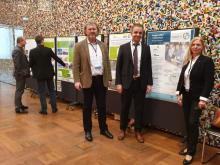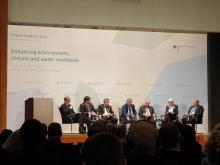On Jan 28, the foreign ministers of all Central Asian countries as well as Afghanistan met in Berlin at the conference Green Central Asia – Enhancing Environment, Climate and Water Resilience. The event marked the launch of the project Green Central Asia, a regional initiative on climate and security in Central Asia and Afghanistan beginning in 2020. CASIB was also present, with the entire core team attending.
Main objective of said initiative – which will play a part in implementing the EU's latest Central Asia Strategy from June 2029 – is to promote the dialogue about climate changes and the region-specific risks that go along with it. It aims at facilitating access to information and risk assessments to capacitate the target regions Central Asia and Afghanistan to better judge the adverse impacts of climate change and take preventative measures.
Germany's foreign minister Heiko Maas opened the conference with a speech in which he emphasised that today's great risks, among them man-made climate change, do not know any borders – which means that national responses to these challenges are by no means sufficient at this point. He stressed that ecological problems have long turned into questions of security and stability, because where climate changes jeopardises people's livelihoods, conflicts are bound to occur.
The fact that the Central Asian countries and Afghanistan will be hit particularly hard by its implications, has been scientifically proven and repeatedly addressed by CLIENT II projects in the region – for instance, within the key subjects climate protection/energy efficiency, adaptation to climate change, sustainable energy systems, and water management. In this context, a representative from Kazakhstan explained that the proportion of renewable energy sources in Kazakhstan is intended to reach 10 % by 2030 and 50 % by 2050; an ambition that partly relies on support through German investments.
In this spirit, foreign minister Heiko Maas invited the Central Asian countries to join a Group of Friends consisting of 48 countries, including Afghanistan, which deals with matters of security related to the effects of climate change.
Another leading theme behind Green Central Asia are the networks between politics, economy, research, and the population of Central Asia's countries, as well as between Germany and Central Asia, against the backdrop of a mutual objective – sustainable stability and growth throughout the entire region.
Moreover, Josep Borrell, the EU's High Representative for Foreign Affairs and Security Policy, greeted the attending parties. The aforementioned issues also affect the European Union, which becomes evident, for example, through its Central Asia Strategy or the Central Asia Water and Energy Program, a partnership between the World Bank, EU, Switzerland, and UK. The address was followed by a panel discussion with the foreign ministers of all attending countries, opened with a keynote by Prof. Dr. Johan Rockström (Potsdam Institute for Climate Impact Research). The last part of the morning formed the signing of a joint memorandum of understanding.
The afternoon was dedicated to topic-specific panels with experts and decisionmakers from the respective fields:
- Climate-related security risks and response capacities in Central Asia and Afghanistan
- Outlook Green Central Asia – Enhancing Environment, Climate, and Water Resilience
A next step will be the second Berlin Climate and Security Conference on June 15-16 in Berlin. For CASIB, this event provided ample opportunities to inform about CLIENT II and currently running projects in Central Asia, considering the thematic overlap. It created a space for fruitful exchange about the funding programme – particularly on the areas of climate, water, and energy – with local stakeholders, e. g. from politics and research.
- Log in to post comments


